山东省诸城市四县2014-2015学年高二下学期期末英语试题 扫描版含答案
2014-2015学年山东省高二英语下学期期中试题含答案

2014-2015学年第二学年第三学段学分认定考试英语试题本试卷分第Ⅰ卷和第Ⅱ卷两部分,共10页,满分120分。
考试时间120分钟。
考试结束后,将答题卡和答题纸一并交回。
注意事项:1. 答题前,考生务必用0.5毫米黑色签字笔将自己的姓名、座号、准考证号和科目填写在答题卡和试卷规定的位置上。
2. 第Ⅰ卷每小题选出答案后,用2B铅笔把答题卡上对应题目的答案标号涂黑;如需改动,用橡皮擦干净后,再选涂其他答案标号。
3. 第Ⅱ卷的答案必须用黑色签字笔写在答题纸各题目指定区域内相应的位置,不能写在试卷上;如需改动,先划掉原来的答案,然后再写上新的答案;不能使用涂改液、胶带纸、修正带。
不按以上要求作答的答案无效。
第Ⅰ卷(共75分)第一部分听力(共两节,满分10分)该部分分为第一、第二两节。
注意:回答听力部分时,请先将答案标在试卷上。
听力部分结束前,你将有两分钟的时间将你的答案转涂到客观题答题卡上。
第一节(共5小题;每小题0.5分,满分2.5分)听下面5段对话。
每段对话后有一个小题,从题中所给的A、B、C三个选项中选出最佳选项,并标在试卷的相应位置。
听完每段对话后,你都有10秒钟的时间来回答有关小题和阅读下一小题。
每段对话仅读一遍。
1.What do we know from the conversation?A.John may go to law school.B.John won’t be in law school.C.John wants to leave law school.2.Why does the woman like the color orange?A.Because it means the harvest.B.Because she likes to eat oranges.C.Because it means the coming of a new school term.3.What did the doctor tell the man to do?A.To do more exercise.B.To give up smoking.C.Not to drink hard drinks.4.What does the man want?A. A map of China in English.B. A map of China in Chinese.C. A map of China in Japanese.5.What is the correct time?A.10:10pmB. 10:30pmC. 10:20pm第二节(共15小题;每小题0.5分,满分7.5分)听下面5段对话或独白。
高二英语下学期第二次质量检测试题-人教版高二全册英语试题
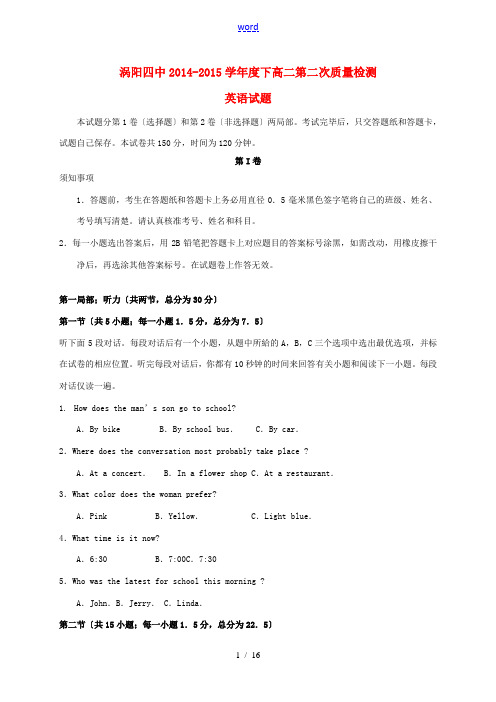
涡阳四中2014-2015学年度下高二第二次质量检测英语试题本试题分第1卷〔选择题〕和第2卷〔非选择题〕两局部。
考试完毕后,只交答题纸和答题卡,试题自己保存。
本试卷共150分,时间为120分钟。
第I卷须知事项1.答题前,考生在答题纸和答题卡上务必用直径0.5毫米黑色签字笔将自己的班级、姓名、考号填写清楚。
请认真核准考号、姓名和科目。
2.每一小题选出答案后,用2B铅笔把答题卡上对应题目的答案标号涂黑,如需改动,用橡皮擦干净后,再选涂其他答案标号。
在试题卷上作答无效。
第一局部;听力〔共两节,总分为30分〕第一节〔共5小题;每一小题1.5分,总分为7.5〕听下面5段对话。
每段对话后有一个小题,从题中所給的A,B,C三个选项中选出最优选项,并标在试卷的相应位置。
听完每段对话后,你都有10秒钟的时间来回答有关小题和阅读下一小题。
每段对话仅读一遍。
1.How does the man’s son go to school?A.By bike B.By school bus. C.By car.2.Where does the conversation most probably take place ?A.At a concert.B.In a flower shop C.At a restaurant.3.What color does the woman prefer?A.Pink B.Yellow.C.Light blue.4.What time is it now?A.6:30 B.7:00C.7:305.Who was the latest for school this morning ?A.John.B.Jerry. C.Linda.第二节〔共15小题;每一小题1.5分,总分为22.5〕听下面5段对话或独白。
每段对话或独白后有几个小题,从题中所給的A,B,C三个选项中选出最优选项,标在试卷的相应位置。
高二英语
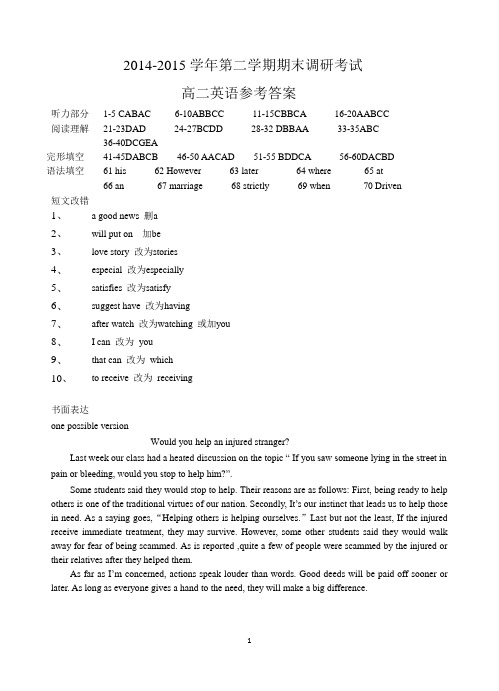
2014-2015学年第二学期期末调研考试高二英语参考答案听力部分1-5 CABAC 6-10ABBCC 11-15CBBCA 16-20AABCC阅读理解21-23DAD 24-27BCDD 28-32 DBBAA 33-35ABC36-40DCGEA完形填空41-45DABCB 46-50 AACAD 51-55 BDDCA 56-60DACBD语法填空61 his 62 However 63 later 64 where 65 at66 an 67 marriage 68 strictly 69 when 70 Driven短文改错1、 a good news 删a2、will put on 加be3、love story 改为stories4、especial 改为especially5、satisfies 改为satisfy6、suggest have 改为having7、after watch 改为watching 或加you8、I can 改为you9、that can 改为which10、to receive 改为receiving书面表达one possible versionWould you help an injured stranger?Last week our class had a heated discussion on the topic “ If you saw someone lying in the street in pain or bleeding, would you stop to help him?”.Some students said they would stop to help. Their reasons are as follows: First, being ready to help others is one of the traditional virtues of our nation. Secondly, It’s our instinct that leads us to help those in need. As a saying goes,“Helping others is helping ourselves.”Last but not the least, If the injured receive immediate treatment, they may survive. However, some other students said they would walk away for fear of being scammed. As is reported ,quite a few of people were scammed by the injured or their relatives after they helped them.As far as I’m concerned, actions speak louder than words. Good deeds will be paid off sooner or later. As long as everyone gives a hand to the need, they will make a big difference.附:(听力材料)(Text 1)W: Excuse me. Is the flight from New York on time?M: Yes, it is. It should be arriving in 20 minutes at Gate 5.(Text 2)W: It’s very hard to decide what to eat. The pizza and the hamburgers are both good at this restaurant.M: If you ca n’t make up your mind soon, we won’t ever make it to the cinema.(Text 3)M: I met Jim on the street today.W: Really? Did he say anything about his brother?M: Yes. He will be leaving California very soon, because his wife has taken a job in Houston.(Text 4)W: Hi, Sam. I hear you’re going to Chicago.M: Yeah. I have an international meeting there.W: When are you leaving?M: This coming Friday, that is to say, the day after tomorrow.(Text 5)W: Hi, Tom! How are you today?M: Fine, thanks. What’s up, Ann?W: There’s an American folk concert tomorrow night. Do you want to go with me?M: Sorry. I don’t want to miss my favorite movie on TV then, and besides, I really prefer jazz, not folk music.(Text 6)W: Would you like some coffee?M: Yes, but I don’t think you have time. You’re working this evening, aren’t you?W: Yes, but I won’t start until 8:30. That’s half an hour from now. In fact, I wanted to ask you for a favor.M: What is it? Go ahead.W: Do you still remember me talking about Sally and David?M: You mean your friends from New York? Why?W: They will stay here for a couple of weeks, and I wonder if you’d be free to show them around a bit.M: I’d love to.W: They haven’t been to Hong Kong before, so you’d have plenty of choices of where to take them.(Text 7)M: Morning, Mary. I haven’t seen you for a long time. What’s up?W: Oh, hi Frank! I took up a new hobby.M: So you don’t travel as much as before?W: No. I’m much more interested in inventing useful things now. I’ve already started doing someresearch.M: That’s certainly a practical hobby. I know of many such people who have turned out to be great inventors.W: It certainly is. It’s so much fun.M: It also results in a lot of profit if they succeed in inventing something truly useful.W: It re ally does if the invention becomes widely used in people’s daily lives.M: Well, good luck! I hope you will be successful sooner rather than later.W: Thanks.(Text 8)W: Mr. Depp, I’m going to teach in Paris very soon, perhaps next month.M: Congratulatio ns, Miss Evans! I’m sure you will be very happy there. Paris is such a big city; there are a lot of interesting things to see.W: Yes, that’s why I’ve come to you. You studied there, right? I have mixed feelings, you see. I’m excited but I’m also a bit wor ried.M: What’s bothering you?W: It’s this: someone told me that people from Paris look down upon people from other places. Is this true?M: Oh, yes. I hate that kind of attitude. Some people in Paris do, but I’m sure not everyone in Paris is like that.W: That attitude is difficult for me to understand. You know a lot of my classmates here are from other countries. I often help them, and I’ve learned a lot from them. They are all hard-working. Most of them are very talented.M: Well, I’m sure you will find life in Paris to be wonderful, even if some people aren’t very nice. It’s a beautiful city in which to start a new life.W: Yes. I feel excited. I’ll e-mail you when I settle down.M: Thank you. Then goodbye and good luck!(Text 9)M: Hello, Linda. What are you reading?W: Hi, Jim. I am reading one of Shakespeare’s plays, The Merchant of Venice. Why are you here? Weren’t you supposed to go picnicking in the park?M: Well, Bob couldn’t make it, so I didn’t want to go, either. So is that one of his four tra gedies?W: No, it’s one of his comedies. It’s a quite enjoyable book.M: Have you read it before?W: Yes, I’ve read it several times. So Jim, do you like reading books?M: Yes, but it is difficult for me to read in English.W: Well, you know, everything is difficult at first. Reading can be fun if you really get into it.M: Do you like reading books other than literary works?W: Yes, I spend most of my leisure time reading books on a variety of subjects. I want to make full use of every minute.M: It seems everything is easy for you.W: I think everything is easy if you’re willing to do it. If you like, you could use that method toimprove your English. What do you think?M: Yes, I know learning English by doing something I like would help me improve, but I would still have to take out time to watch TV to improve my listening.W: Why not talking to native speakers or listening to the radio?(Text 10)Welcome to the History and Archaeology website. This website has been set up with the aim of providing answers to all questions about history and archaeology you might have. The site is full of resources and links to other information. For example, there is a great deal of information available for anyone interested in any of the world wars, as well as 12 clubs focusing on that subject in 8 different countries and a lot of other general activities to get involved in. You can sign up for an online group and meet lots of people who have similar ideas and interests, or you can become an archaeologist and discover even more things to add to the vivid picture we already have about these many different eras of history.If you aren’t so interested in doing the work yourself but you r eally enjoy seeing and even owning, there are 6 different fairs or forums where you can get items from the more recent wars, such as things that have been kept from last century’s two world wars or even from wars as distant as those fought in the Middle Ages, although there are no items available yet from the Greek or Roman era. Please let us know what you think of our website. We are always happy to hear your thoughts.。
14—15学年下学期高二期末考试英语试题(附答案)(5)
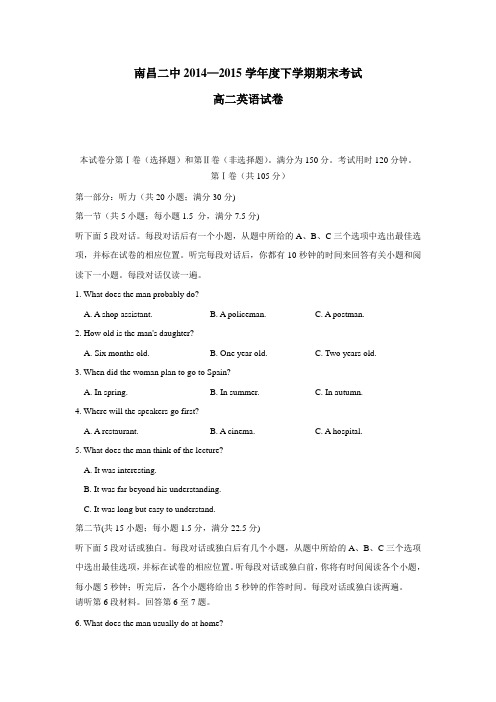
南昌二中2014—2015学年度下学期期末考试高二英语试卷本试卷分第Ⅰ卷(选择题)和第Ⅱ卷(非选择题)。
满分为150分。
考试用时120分钟。
第Ⅰ卷(共105分)第一部分:听力(共20小题;满分30分)第一节(共5小题;每小题1.5 分,满分7.5分)听下面5段对话。
每段对话后有一个小题,从题中所给的A、B、C三个选项中选出最佳选项,并标在试卷的相应位置。
听完每段对话后,你都有10秒钟的时间来回答有关小题和阅读下一小题。
每段对话仅读一遍。
1. What does the man probably do?A. A shop assistant.B. A policeman.C. A postman.2. How old is the man's daughter?A. Six months old.B. One year old.C. Two years old.3. When did the woman plan to go to Spain?A. In spring.B. In summer.C. In autumn.4. Where will the speakers go first?A. A restaurant.B. A cinema.C. A hospital.5. What does the man think of the lecture?A. It was interesting.B. It was far beyond his understanding.C. It was long but easy to understand.第二节(共15小题;每小题1.5分,满分22.5分)听下面5段对话或独白。
每段对话或独白后有几个小题,从题中所给的A、B、C三个选项中选出最佳选项,并标在试卷的相应位置。
听每段对话或独白前,你将有时间阅读各个小题,每小题5秒钟;听完后,各个小题将给出5秒钟的作答时间。
高中英语真题-2014—2015学年下学期高二年级期末考试
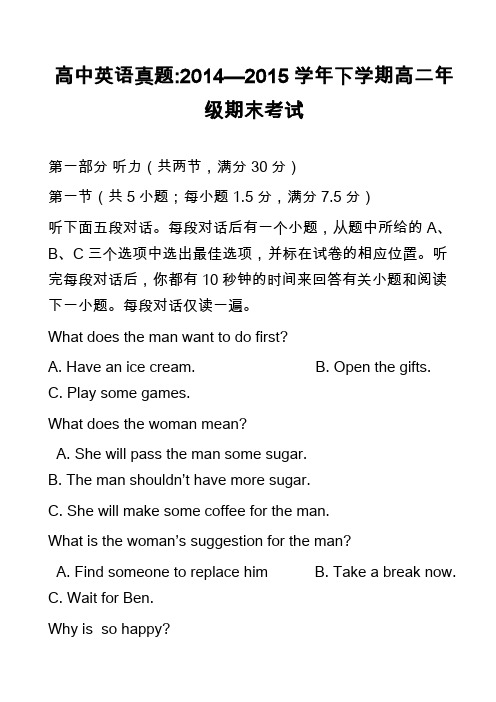
高中英语真题:2014—2015学年下学期高二年级期末考试第一部分听力(共两节,满分30分)第一节(共5小题;每小题1.5分,满分7.5分)听下面五段对话。
每段对话后有一个小题,从题中所给的A、B、C三个选项中选出最佳选项,并标在试卷的相应位置。
听完每段对话后,你都有10秒钟的时间来回答有关小题和阅读下一小题。
每段对话仅读一遍。
What does the man want to do first?A. Have an ice cream.B. Open the gifts.C. Play some games.What does the woman mean?A. She will pass the man some sugar.B. The man shouldn’t have more sugar.C. She will make some coffee for the man.What is the woman’s suggestion for the man?A. Find someone to replace himB. Take a break now.C. Wait for Ben.Why is so happy?A. She has received her favorite journal.B. She has w on a prize for her research.C. She has got her paper published.What are the speakers mainly talking about?A. An interesting film.B. Some history books.C. Their activities last night.第二节(共15小题;每小题1.5分,满分22.5分)听下面5段对话。
每段对话后有几个小题,从题中所给的A、B、C三个选项中选出最佳选项,并标在试卷的相应位置。
高二英语期中考试
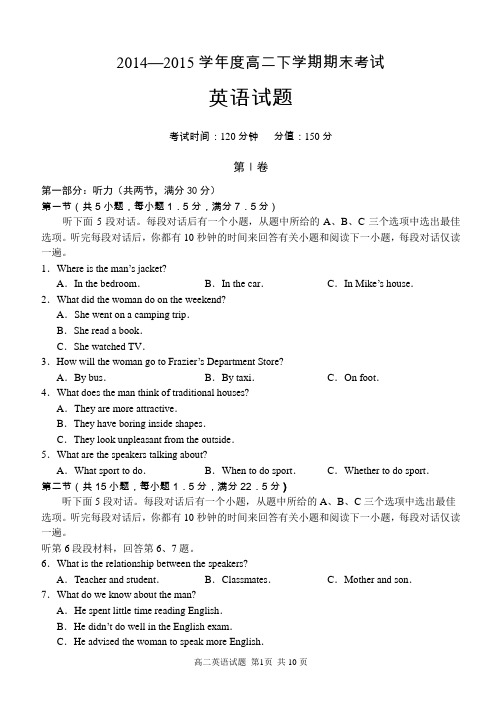
2014—2015学年度高二下学期期末考试英语试题考试时间:120分钟分值:150分第Ⅰ卷第一部分:听力(共两节,满分30分)第一节(共5小题,每小题1.5分,满分7.5分)听下面5段对话。
每段对话后有一个小题,从题中所给的A、B、C三个选项中选出最佳选项。
听完每段对话后,你都有10秒钟的时间来回答有关小题和阅读下一小题,每段对话仅读一遍。
1.Where is the man’s jacket?A.In the bedroom.B.In the car.C.In Mike’s house.2.What did the woman do on the weekend?A.She went on a camping trip.B.She read a book.C.She watched TV.3.How will the woman go to Frazier’s Department Store?A.By bus.B.By taxi.C.On foot.4.What does the man think of traditional houses?A.They are more attractive.B.They have boring inside shapes.C.They look unpleasant from the outside.5.What are the speakers talking about?A.What sport to do.B.When to do sport.C.Whether to do sport.第二节(共15小题,每小题1.5分,满分22.5分)听下面5段对话。
每段对话后有一个小题,从题中所给的A、B、C三个选项中选出最佳选项。
听完每段对话后,你都有10秒钟的时间来回答有关小题和阅读下一小题,每段对话仅读一遍。
听第6段段材料,回答第6、7题。
6.What is the relationship between the speakers?A.Teacher and student.B.Classmates.C.Mother and son.7.What do we know about the man?A.He spent little time reading English.B.He didn’t do well in the English exam.C.He advised the woman to speak more English.听第7段段材料,回答第8、9题。
高二英语试题
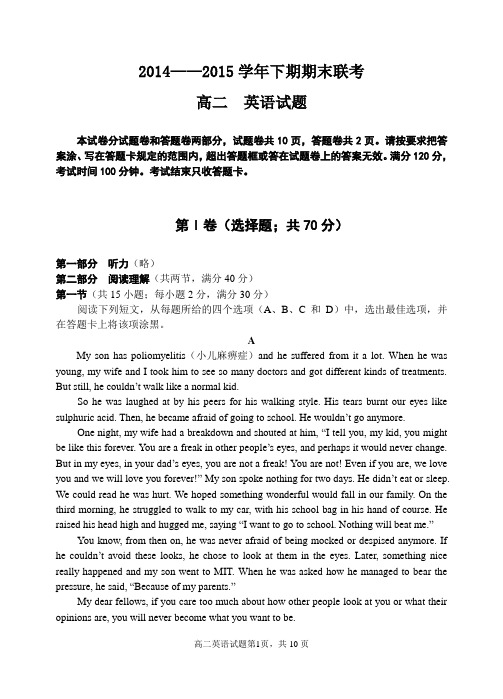
2014——2015学年下期期末联考高二英语试题本试卷分试题卷和答题卷两部分,试题卷共10页,答题卷共2页。
请按要求把答案涂、写在答题卡规定的范围内,超出答题框或答在试题卷上的答案无效。
满分120分,考试时间100分钟。
考试结束只收答题卡。
第Ⅰ卷(选择题;共70分)第一部分听力(略)第二部分阅读理解(共两节,满分40分)第一节(共15小题;每小题2分,满分30分)阅读下列短文,从每题所给的四个选项(A、B、C和D)中,选出最佳选项,并在答题卡上将该项涂黑。
AMy son has poliomyelitis(小儿麻痹症)and he suffered from it a lot. When he was young, my wife and I took him to see so many doctors and got different kinds of treatments. But still, he couldn’t walk like a normal kid.So he was laughed at by his peers for his walking style. His tears burnt our eyes like sulphuric acid. Then, he became afraid of going to school. He wouldn’t go anymore.One night, my wife had a breakdown and shouted at him, “I tell you, my kid, you might be like this forever. You are a freak in other people’s eyes, and perhaps it would never change. But in my eyes, in your dad’s eyes, you are not a freak! You are not! Even if you are, we love you and we will love you forever!” My son spoke nothing for two days. He didn’t eat or sleep. We could read he was hurt. We hoped something wonderful would fall in our family. On the third morning, he struggled to walk to my car, with his school bag in his hand of course. He raised his head high and hugged me, saying “I want to go to school. Nothing will beat me.”You know, from then on, he was never afraid of being mocked or despised anymore. If he couldn’t avoid these looks, he chose to look at them in the eyes. Later, something nice really happened and my son went to MIT. When he was asked how he managed to bear the pressure, he said, “Because of my parents.”My dear fellows, if you care too much about how other people look at you or what their opinions are, you will never become what you want to be.21. The author’s son was laughed at by his peers, because _________.A. he didn’t do well in his lessonsB. he walked in a strange wayC. he was from a poor familyD. he often burst into tears22. After hearing what the mother said, the son _________.A. quarrelled with his mother and left home angrilyB. went to school unwillingly without speaking anythingC. burst out crying complaining his bad experienceD. didn’t say anything without eating or sleeping for two days23. Which of the following is NOT right according to the passage?A. The boy was brave to face any difficulty after being encouraged by his mother.B. The boy achieved success and was admitted to a famous university.C. The boy finally could walk like a normal child after some treatments.D. The boy owed his success to his parents and was grateful to them.24. From the passage we can say the boy is .A. confident and outgoingB. brave and hard-workingC. wise and easy-goingD. determined and braveBThe British MuseumDescription:The British Museum is a museum in London, which is one of the world’s greatest museums of human history and culture. Its collections, which number more than 13 million objects, are amongst the largest and most comprehensive in the world and originate from all continents, illustrating and documenting the story of human culture from its beginning to the present.The British Museum was established in 1753, largely based on the collections of the physician and scientist Sir Hans Sloane. The museum first opened to the public on 15 January 1759 in Montagu House in Bloomsbury, on the site of the current museum building. Its expansion over the following two and a half centuries was largely a result of an expanding British colonial footprint and has resulted in the creation of several branch institutions. Until 1997, when the British Library(previously centered on the Round Reading Room)moved to a new site, the British Museum housed both a national museum of antiquities and a national library in the same building. The museum is a non-departmental public body sponsored(赞助)by the Department for Culture, Media and Sport. Since 2002 the director of the museum has been Neil MacGregor.Admission and opening hours:The museum is open every day from 10am to 6pm(Fridays 10am to 5:30pm)and itcharges no admission fee, except for loan exhibitions.How to get there:By train: 7:00-18:30 every day.By Underground: 8:00-18:30 every day.By bus: 7:30-18:30 every day.By coach: 7:00-19:30 every day.Nearest underground stations:Tottenham Court Road(500m)Holborn(500m)Russell Square(800m)25. When was the British Museum opened to the public for the first time?A. In 1753.B. In 1759.C. In 1997.D. In 2002.26. You are at the Museum at seven in the evening and you want to go back to Oxford. Whichmeans of transportation will you choose?A. By coach.B. By bus.C. By train.D. By underground.27. Which statement is TRUE according to the text?A. The British Museum has collected less than 13 million objects.B. The British Museum is open from 10 am to 6 pm every day.C. The British Museum is a great museum of human history and culture.D. The British Museum’s expansion in the past was not a result of an expanding Britishcolonial footprint.C“Where are we going, Dad?”, one of the hottest Chinese reality shows, has become a hit. Many famous stars brought their children to a strange village alone, and they had to spend 72 hours with their children there. The program fully showed us a modern version of the “how to be a good father”. As the young parents today are too busy to take care of their children, this new form of “Lost on the way” played by nanny Daddy and cute kids raised a lot of people’s emotional common feelings. Both the kids and their parents will find that their hearts are being drawn closer. But this kind of feeling has just proved that there is a big spiritual barrier between the modern parents and children.The TV shows l ike “Children are hard to support!”, “Where are we going, Dad?”, “hot moms” and “cute kids” are becoming more and more popular. All of these show the new parents’confusion in children’s education and the appeal for the balance between career and family.In real life, on the one hand, the young parents feel helpless because they are too busy toaccompany their children under the pressures of work and life; on the other hand, they continue to do so. The data collected by Hunan TV shows that nearly two-thirds of their audience are female, among whom 36% are aged from 25 to 34. We can imagine such a scene that one evening a young mother is watching the show with her young children, while her husband is still at work or trapped in socializing, or maybe is just playing computer games in the bedroom. The story of a child without the company of father is still going on. In fact, it is sometimes the same to mothers. In a modern family, it is often the old who take the responsibility of raising a child. The partic ipation of mother in the children’s education is also very low.It is just this kind of confusion where the parents have gone in the modern family education, and where the parents will guide their children to go that “Where are we going, Dad?” shows us. If a child wants to grow up healthily and safely into a modern citizen with independent personality and free spirit, it is very important for him or her to follow the parents who serve as their first teacher. Maybe this is the real reason why such kind of TV programs could get hot. The truth is that children will go where their parents go; and society will go where the children go.28. In raising a child in modern society, parents should _______.A. let their children go without caring anythingB. keep their children at home to avoid socializingC. balance well between family and careerD. break down the barrier between children and teachers29. Which of the following can be inferred in the passage?A. Parents shouldn’t entirely leave the educatio n of children to the old.B. 36% of the audience of the program are female aged from 25-34.C. The program shows us the confusion where the parents and children will go to play.D. In a modern family it is often mothers who are responsible for raising a child.30. The passage suggests young parents feel helpless in raising children mainly because_______.A. they have no professional knowledge for this fieldB. the old are free and forced to raise the grandchildren insteadC. their children feel isolated and lonely with themD. they are occupied with working and making a living31. What chief attitude towards modern family education does the author express in thepassage?A. Pessimistic.B. Worried.C. Optimistic.D. Indifferent.DSchool is much more than a place where students gather to learn. For children, school is their first opportunity for social development and introduction to people outside of their family unit. Lessons learned in school go beyond mathematics and language arts. Students learn to develop individual interests and find other people who share their interests.Music is one of the ways like-minded children come together. When many people talk about the benefits of music education, they’re quick to point out all of the numerous and measurable results of music education, many studies show the positive impact music programs can have on children in other areas of study.Dr. Laurel Trainor, a professor of psychology, at McMaster University, has said young children who take music lessons show different brain development and improved memory compared to children who do not receive musical training. Stanford University researchers have found that musical training improves how the brain processes the spoken word; a finding that researchers say could lead to improving the reading ability of children who have dyslexia and other reading problems.Furthermore, in an analysis of data on more than 25,000 secondary school students, researchers at the United States Department of Education found that students who report consistent involvement in instrumental music during middle school and high school perform significantly better in mathematics by Grade 12 than those who do not participate in music programs.There are many reasons why music education can help to make a child a better student, but there also are other benefits that go beyond the classroom environment.Being involved in music is also a social endeavor that can set the course for lifelong friends and help create social groups that last through school and beyond. Music education breeds familiarity during a school career, when going from class to class or from school to school every year can be nerve wracking and unfamiliar.32. What is the function of the first paragraph?A. To show school is the place for students to learn.B. To stress the importance of learning knowledge.C. To lead to the main topic of the passage.D. To explain what the author really thinks of.33. According to the researchers, we can know that ________.A. music lovers tend to use their brain in a wise wayB. music training can cure children of many diseasesC. learning music is beneficial to students’ performa nce in mathematicsD. senior students disliked attending music lessons34. What does the underlined word “dyslexia” mean?A. Having difficulty with reading.B. Receiving training for music.C. Gaining knowledge from learning.D. Losing the ability to read music.35. It can be concluded from the passage that ________.A. music can ensure you have a lot of close friendsB. changing schools is a bad experience for everyoneC. music does offer social and understanding benefitsD. few schools really focus on music education第二节(共5小题;每小题2分,满分10分)根据短文内容,从短文后的选项中选出填入空白处的最佳选项并在答题卡上将该项涂黑。
15学年下学期高二期末考试英语试题(A卷)(附答案)

宝鸡中学2014-2015学年度第2学期期末考试高二英语试题说明:1.本试题分I,II两卷,第一卷的答案要按照A,B卷要求涂到答题卡上,第一卷不交;2.全卷共7大题型(67小题;3主观题)(满分150分,100分钟完卷)第I卷(共100分)第一部分听力(共两节,满分30分)第一节(共5小题;每小题1.5分,满分7.5分)1. What does the woman probably do?A. A waitress.B. An editor.C. A policewoman.2. What is the age limit for driving in the woman's province?A. 16.B. 18.C. 20.3. What can't Alice play?A. The drums.B. The piano.C. The guitar.4. What is the man going to do?A. Go on a business trip.B. Work on a computer.C. Give some lectures5. What should the man do in the woman’s opinion?A. Dance.B. Play basketball.C. Listen to music.第二节(共15小题;每小题1.5分,满分22.5分)听第6段材料,回答第6,7题6. What kind of room will the man take?A. A double room.B. A suite.C. A single room.7. What day is it today?A. Friday.B. Wednesday.C. Saturday听第7段材料,回答第8,9题8. What isn't there in the hall?A. A TV set.B. A telephone.C. A big mirror.9. What do we know about the bathroom?A. It is on the right of the dining room.B. It is large.C. The toilet in it is new.听第8段材料,回答第10-12题10. What is the woman like?A. Outgoing.B. Quiet.C. Generous.11. How often did the man eat pizza?A. Once a month.B. At least once a week.C. Twice a month.12. Where will they have the meal?A. In an Italian restaurant.B. In the woman's house.C. In a Chinese restaurant.听第9段材料,回答第13-16题13. What will Lisa go to France for?A. Studying.B. Working.C. Traveling.14. How much French can Lisa understand now?A. Nothing.B. A little.C. Too much.15. What does the boy think of Lisa?A. Smart.B. Outgoing.C. Stupid.16. What will the boy do probably?A. Learn a foreign language.B. Watch the TV programs.C. Apply for studying abroad.听第10段材料,回答第17-20题17. How many universities has Hawking studied in?A. None.B. One.C. Two.18. What happened to Hawking when he was 20?A. His mother died.B. He began to work in a hospital.C. He got a serious illness.19. What do we know about Hawking after he left the hospital?A. He didn't give up his life.B. He realized his life was terrible.C. He had four children.20. What does Hawking believe?A. Life is rather fair.B. Never lose your hope.C. Nobody can do the best.第二部分语法和词汇知识(共14小题;每小题1分;满分14分)从每题所给A、B、C、D四个选项中,选出可以填入空白处的最佳选项,并填涂在答题卡的相应位置。
山东省潍坊市四县市2014-2015学年度高二上学期期中模块监测英语试题word版含答案(精校版)
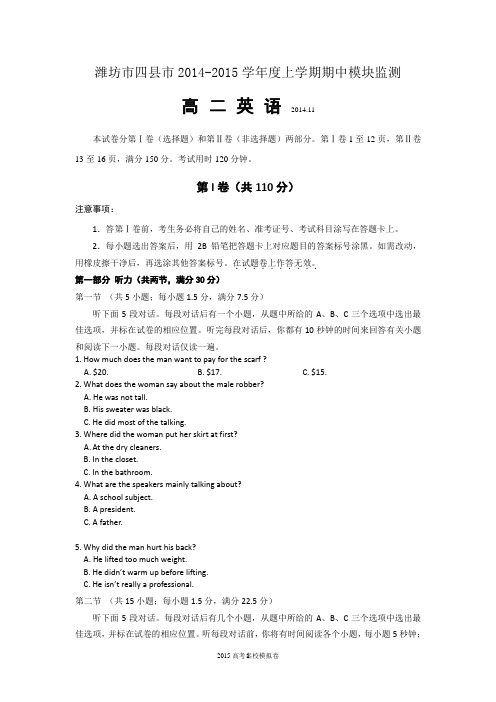
潍坊市四县市2014-2015学年度上学期期中模块监测高二英语2014.11本试卷分第Ⅰ卷(选择题)和第Ⅱ卷(非选择题)两部分。
第Ⅰ卷1至12页,第Ⅱ卷13至16页,满分150分。
考试用时120分钟。
第I卷(共110分)注意事项:1.答第Ⅰ卷前,考生务必将自己的姓名、准考证号、考试科目涂写在答题卡上。
2.每小题选出答案后,用2B铅笔把答题卡上对应题目的答案标号涂黑。
如需改动,用橡皮擦干净后,再选涂其他答案标号。
在试题卷上作答无效。
..........第一部分听力(共两节,满分30分)第一节(共5小题;每小题1.5分,满分7.5分)听下面5段对话。
每段对话后有一个小题,从题中所给的A、B、C三个选项中选出最佳选项,并标在试卷的相应位置。
听完每段对话后,你都有10秒钟的时间来回答有关小题和阅读下一小题。
每段对话仅读一遍。
1. How much does the man want to pay for the scarf ?A. $20.B. $17.C. $15.2. What does the woman say about the male robber?A. He was not tall.B. His sweater was black.C. He did most of the talking.3. Where did the woman put her skirt at first?A. At the dry cleaners.B. In the closet.C. In the bathroom.4. What are the speakers mainly talking about?A. A school subject.B. A president.C. A father.5. Why did the man hurt his back?A. He lifted too much weight.B. He didn’t warm up before lifting.C. He isn’t really a professional.第二节(共15小题;每小题1.5分,满分22.5分)听下面5段对话。
高中英语真题-2014—2015学年度下学期高二期末考试

高中英语真题:2014—2015学年度下学期高二期末考试第 I 卷第一部分:听力(共两节,满分30分)第一部分听力(共两节,满分30分)第一节(共5小题;每小题1.5分,满分7.5分)听下面5段对话。
每段对话后有一个小题,从题中所给的A、B、C三个选项中选出最佳选项,并标在试卷的相应位置。
听完每段对话后,你都有10秒钟的时间来回答有关小题和阅读下一小题。
每段对话仅读一遍。
1. What does the woman like collecting best?A. Stamps.B. Coins.C. Train tickets.2. Which country found lovely music is good for people’s heart s?A. America.B. Australia.C. Russia.3. What is the woman eager to buy?A. Ice creams.B. Candy.C. Drinks.4. Where are the two speakers?A. In the bank.B. In the classroom.C. In the supermarket .5. What prevented the woman calling the man yesterday?A. She lost her cellphone.B. Her cellphone was power off.C. Her teacher took her cellphone away.第二节 (共15小题;每小题1.5分,满分22.5分)听下面5段对话或独白。
每段对话或独白后有几个小题,从题中所给的A、B、C三个选项中选出最佳选项,并标在试卷的相应位置。
听每段对话或独白前,你将有时间阅读各个小题,每小题5秒钟;听完后,各小题将给出5秒钟的作答时间。
每段对话或独白读两遍。
14—15学年下学期高二期末考试英语试题(附答案)(6)
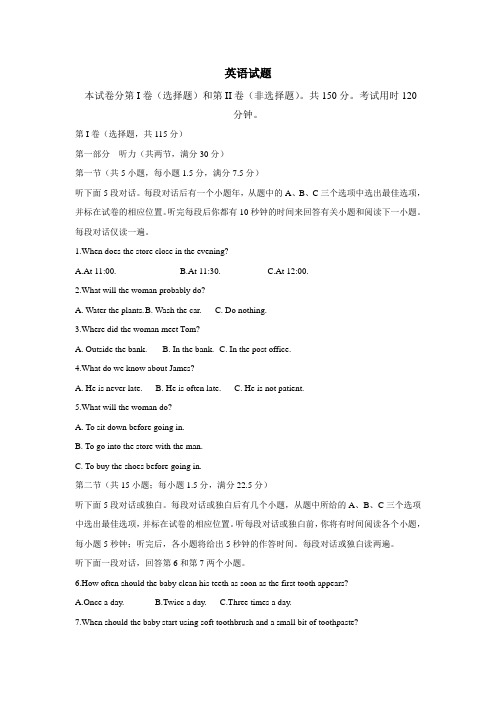
英语试题本试卷分第I卷(选择题)和第II卷(非选择题)。
共150分。
考试用时120分钟。
第I卷(选择题,共115分)第一部分听力(共两节,满分30分)第一节(共5小题,每小题1.5分,满分7.5分)听下面5段对话。
每段对话后有一个小题年,从题中的A、B、C三个选项中选出最佳选项,并标在试卷的相应位置。
听完每段后你都有10秒钟的时间来回答有关小题和阅读下一小题。
每段对话仅读一遍。
1.When does the store close in the evening?A.At 11:00.B.At 11:30.C.At 12:00.2.What will the woman probably do?A. Water the plants.B. Wash the car.C. Do nothing.3.Where did the woman meet Tom?A. Outside the bank.B. In the bank.C. In the post office.4.What do we know about James?A. He is never late.B. He is often late.C. He is not patient.5.What will the woman do?A. To sit down before going in.B. To go into the store with the man.C. To buy the shoes before going in.第二节(共15小题;每小题1.5分,满分22.5分)听下面5段对话或独白。
每段对话或独白后有几个小题,从题中所给的A、B、C三个选项中选出最佳选项,并标在试卷的相应位置。
听每段对话或独白前,你将有时间阅读各个小题,每小题5秒钟;听完后,各小题将给出5秒钟的作答时间。
每段对话或独白读两遍。
听下面一段对话,回答第6和第7两个小题。
2014-2015学年度高二期末英语试题(含解析)
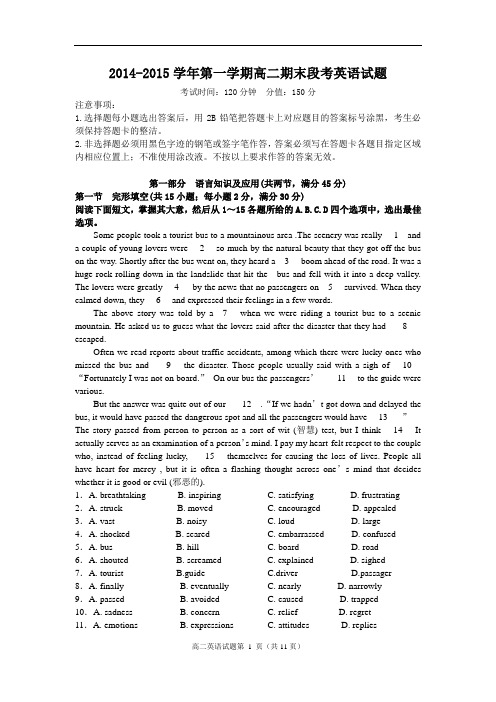
2014-2015学年第一学期高二期末段考英语试题考试时间:120分钟分值:150分注意事项:1.选择题每小题选出答案后,用2B铅笔把答题卡上对应题目的答案标号涂黑,考生必须保持答题卡的整洁。
2.非选择题必须用黑色字迹的钢笔或签字笔作答,答案必须写在答题卡各题目指定区域内相应位置上;不准使用涂改液。
不按以上要求作答的答案无效。
第一部分语言知识及应用(共两节,满分45分)第一节完形填空(共15小题;每小题2分,满分30分)阅读下面短文,掌握其大意,然后从1~15各题所给的A.B.C.D四个选项中,选出最佳选项。
Some people took a tourist bus to a mountainous area .The scenery was really __1__and a couple of young lovers were __2__ so much by the natural beauty that they got off the bus on the way. Shortly after the bus went on, they heard a__3__ boom ahead of the road. It was a huge rock rolling down in the landslide that hit the bus and fell with it into a deep valley. The lovers were greatly __4___by the news that no passengers on__5__ survived. When they calmed down, they __6__ and expressed their feelings in a few words.The above story was told by a__7__ when we were riding a tourist bus to a scenic mountain. He asked us to guess what the lovers said after the disaster that they had ___8___ escaped.Often we read reports about traffic accidents, among which there were lucky ones who missed the bus and ___9__ the disaster. Those people usually said with a sigh of __10__ “Fortunately I was not on board.”On our bus the passengers’___11__ to the guide were various.But the answer was quite out of our ___12__.“If we hadn’t got down and delayed the bus, it would have passed the dangerous spot and all the passengers would have __13___”The story passed from person to person as a sort of wit (智慧) test, but I think __14__ It actually serves as an examination of a person’s mind. I pay my heart-felt respect to the couple who, instead of feeling lucky, ___15__ themselves for causing the loss of lives. People all have heart for mercy , but it is often a flashing thought across one’s mind that decides whether it is good or evil (邪恶的).1.A. breathtaking B. inspiring C. satisfying D. frustrating 2.A. struck B. moved C. encouraged D. appealed 3.A. vast B. noisy C. loud D. large4.A. shocked B. scared C. embarrassed D. confused 5.A. bus B. hill C. board D. road6.A. shouted B. screamed C. explained D. sighed7.A. tourist B.guide C.driver D.passager 8.A. finally B. eventually C. nearly D. narrowly9.A. passed B. avoided C. caused D. trapped10.A. sadness B. concern C. relief D. regret11.A. emotions B. expressions C. attitudes D. replies12.A. touch ` B. expectation C. doubt D. reach13.A. died B. passed C. survived D. stayed14.A. differently B. actually C. similarly D. sincerely 15.A. thanked B. blamed C. apologized D. forgave第二节语法填空(共10小题;每小题1.5分,满分15分)阅读下面短文,按照句子结构的语法性和上下文连贯的要求,在空格处填入一个适当的词或使用括号中词语的正确形式填空。
2014-2015学年度下学期第二次质量检测卷 高二英语试题(2015)
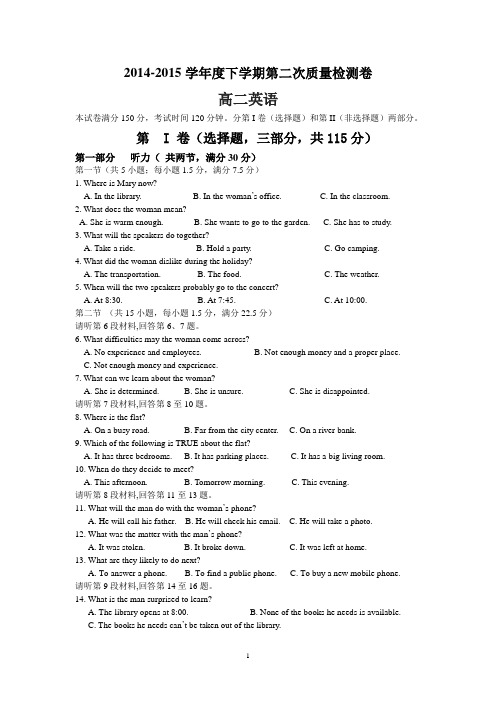
2014-2015学年度下学期第二次质量检测卷高二英语本试卷满分150分,考试时间120分钟。
分第I卷(选择题)和第II(非选择题)两部分。
第 I 卷(选择题,三部分,共115分)第一部分听力(共两节,满分30分)第一节(共5小题;每小题1.5分,满分7.5分)1. Where is Mary now?A. In the library.B. In the woman’s office.C. In the classroom.2. What does the woman mean?A. She is warm enough.B. She wants to go to the garden.C. She has to study.3. What will the speakers do together?A. Take a ride.B. Hold a party.C. Go camping.4. What did the woman dislike during the holiday?A. The transportation.B. The food.C. The weather.5. When will the two speakers probably go to the concert?A. At 8:30.B. At 7:45.C. At 10:00.第二节(共15小题,每小题1.5分,满分22.5分)请听第6段材料,回答第6、7题。
6. What difficulties may the woman come across?A. No experience and employees.B. Not enough money and a proper place.C. Not enough money and experience.7. What can we learn about the woman?A. She is determined.B. She is unsure.C. She is disappointed.请听第7段材料,回答第8至10题。
山东省潍坊市五县2014-2015学年高二英语下学期期中联合考试试题
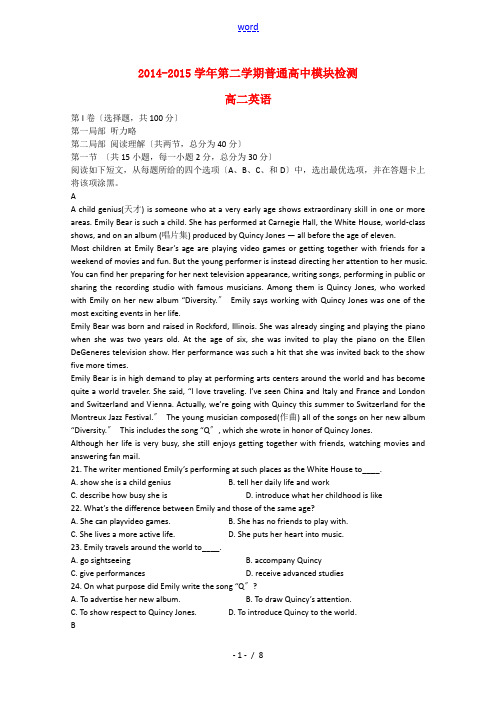
2014-2015学年第二学期普通高中模块检测高二英语第I卷〔选择题,共100分〕第一局部听力略第二局部阅读理解〔共两节,总分为40分〕第一节〔共15小题,每一小题2分,总分为30分〕阅读如下短文,从每题所给的四个选项〔A、B、C、和D〕中,选出最优选项,并在答题卡上将该项涂黑。
AA child genius(天才) is someone who at a very early age shows extraordinary skill in one or more areas. Emily Bear is such a child. She has performed at Carnegie Hall, the White House, world-class shows, and on an album (唱片集) produced by Quincy Jones — all before the age of eleven.Most children at Emily Bear’s age are playing video games or getting together w ith friends for a weekend of movies and fun. But the young performer is instead directing her attention to her music. You can find her preparing for her next television appearance, writing songs, performing in public or sharing the recording studio with famous musicians. Among them is Quincy Jones, who worked with Emily on her new album “Diversity.〞Emily says working with Quincy Jones was one of the most exciting events in her life.Emily Bear was born and raised in Rockford, Illinois. She was already singing and playing the piano when she was two years old. At the age of six, she was invited to play the piano on the Ellen DeGeneres television show. Her performance was such a hit that she was invited back to the show five more times.Emily Bear is in high demand to play at performing arts centers around the world and has become quite a world traveler. She said, “I love traveling. I’ve seen China and Italy and France and London and Switzerland and Vienna. Actually, we’re going with Quincy this summer to Switz erland for the Montreux Jazz Festival.〞The young musician composed(作曲) all of the songs on her new album “Diversity.〞This includes the song “Q〞, which she wrote in honor of Quincy Jones.Although her life is very busy, she still enjoys getting together with friends, watching movies and answering fan mail.21. The writer mentioned Emily’s performing at such places as the White House to____.A. show she is a child geniusB. tell her daily life and workC. describe how busy she isD. introduce what her childhood is like22. What’s the difference between Emily and those of the same age?A. She can playvideo games.B. She has no friends to play with.C. She lives a more active life.D. She puts her heart into music.23. Emily travels around the world to____.A. go sightseeingB. accompany QuincyC. give performancesD. receive advanced studies24. On what purpose did Emily write the song “Q〞?A. To advertise her new album.B. To draw Quincy’s attention.C. To show respect to Quincy Jones.D. To introduce Quincy to the world.BLast week I went to visit my relatives. When I reached London, I found my plane to Newcastle had been cancelled due to bad weather.The airline was helpful—offering me a choice between a night in a hotel or a six-hour bus ride to my destination. Not knowing whether a flight to Newcastle would happen in the next two days, I chose the bus ride.I stored all my baggage in the luggage space of the bus, thinking I would not need anything on the journey.The young lady sitting beside me could see how tired I was and asked me if anyone would be meeting me on my arrival.I realized that I had left my cell phone in my bag and had no way to contact my relatives. They would be waiting for me at the airport about five hours before the bus got to Newcastle, not knowing what had happened. Without hesitation, the young lady offered me the use of her cell phone.When the bus made a rest stop, she asked me if I was getting out. I replied that I wouldn’t as I still had sandals (凉鞋) o n, and bare feet weren’t suitable for the cold weather. When she got back on, she’d bought me some tea and a packet of sweets to eat.When we eventually arrived in Newcastle, the woman checked that someone was there to meet me.I asked her to wait a moment while I got my purse to repay her, but when I looked up she had gone.I was unable to even express my thanks to her.25. We can learn from the passage that the author ______.A. was late for the plane to NewcastleB. planned to meet his relatives in LondonC. lost his cell phone when travelling in BritainD. probably went to London from a warm place26. Which of the following information may be the most important to the author’s relatives?A. When the author would arrive in Newcastle.B. Why the flight was cancelled.C. Where the author spent the night.D. When the weather became fine.27. What does the passage mainly tell us?A. London often suffers from terrible weather.B. Carelessness may sometimes lead to much trouble.C. The author met a helpful woman on his journey.D. The airline was responsible for every passenger.CYou wash your hands many times every day, but do you think they are really clean? To tell you the truth, they’re still covered with microbes, also called “bacteria〞. Microbes are everywhere. But don’t worry—most microbes don’t harm you, and many actually help you stay alive.Now, scientists say the microbes that live on our hands could be useful in a surprising way: fighting crime.When the police visit the scene of a crime, they often look for fingerprints to try to identify the criminal (罪犯). But according to a recent study, investigators could even use microbes to help break a criminal case.Every person has his or her own set of microbes that live on their hands, according to scientists at the University of Colorado. That means the mix of different kinds of microbes on everybody’s hands is unique—much like one’s fingerprints.The scientists wanted to know whether this microbe mix could be used as a new kind of fingerprint—especially in a crime scene where fingerprints might be hard to find. And policemen use forensics such as studying fingerprints to identify the criminal.“Microbe fingerprints are harder to hide, 〞said Noah Fierer, one of the scientists, “You can’t sterilize(杀菌)a surface just by wiping it off. 〞His team compared the bacteria on the hands of 273 people to the bacteria found on each person’s computer keyboard. For the study, the keyboards had been used only by the people who were being tested. The study showed tha t the mix of microbes from each person’s hands matched the mix of microbes on that person’s keyboard. The scientists were easily able to tell the 273 people apart—just by looking at their keyboards.But there are a lot more than 273 criminals. Other scientists wonder whether the microbe fingerprint can really be that useful. Fierer agrees that scientists have a lot more work to do before the microbe fingerprint will be a useful tool.28. Fierer’ s team found through the study that .A. they found the criminal among the 273 peopleB. they could tell who had used the computerC. computer keyboards couldn’t keep people’s microbe fingerprintsD. people’s hands could be recognized by the computer they used29. The underlined word “forensics〞in Paragraph 5 probably refers to_____.A. a new kind of fingerprintB. a kind of newly invented keyboardC. a kind of bacteria on people’s handsD. the scientific test used by the police30. The passage tells us that_____.A. your microbes may give you awayB. scientists will put this method into practice soonC. many scientists think microbe fingerprints uselessD. the microbe fingerprint has been used in many cases31. What’s the best title of the passage?A. How to fight against crimesB. The usefulness of microbesC. The importance of fingerprintsD. Different germs on our handsDNeddine Parker is up by 7 in the morning. After her morning exercises and some housework, she drives to the local hospital, where she volunteers on ce a week. What makes Parker’s routine so extraordinary is that she is 104 years old.“I don’t know why I’m still here,〞she said.Dr. Thomas Perls of the BostonUniversityMedicalCenter is trying to figure that out. As the director of the New England Centenarian (百岁老人) Study, he studies the super humans aged 100 years and older.“It’s like winning the lottery,〞he said. “You’ve got to choose the right numbers and the right combination.〞Researchers believe about 30 percent of aging is genetic(遗传的). For those who get to extremely old ages, family history may play an even more important role.Reuben Landau’s mother lived to 100, and three of his brothers and sisters into their 90s. Landau is nearly 102,and he still practices law a few hours every day. Both Landau and Parker are remarkablyhealthy. They take few medicine and have no major illness.Perls has found that many centenarians lack a type of gene—E4—that is associated with an increased risk of heart disease. One study found the gene is in 29 percent of young men, but only 15 percent of centenarians. Perls also believes they may have a ‘protective gene〞, one that helps them survive what might kill others. Parker, for example,smoked until she was 100 and had a stroke (中风)at 89.However,living into your 100s isn’t just genetics. Aging successfully has much to do with environment and behavior. Landau watches what he eats and exercises his body and mind every day. He’s convinced it’s why he’s still in good health. “People still have to do the right things to ge t to very old age,〞said Perls. So it’s not just the cards you’re dealt, but how you play the hand.32. According to the first two paragraphs, Parker can’t understand _____.A. why researchers are studying herB. why she still can manage her routineC. why she is still living at the age of 104D. why she volunteers once a week in the hospital33. By saying “It’s like winning the lottery,〞Dr. Thomas Perls means ___.A. it takes a long time to win a lotteryB. it is quite unusual to be a centenarianC. it is very difficult to find “super humans〞D. it is a tough job investigating the aging process34. According to the research, Landau and Parker are remarkably healthy because ____.A. the family gene plays a big partB. they enjoy sports and houseworkC. they are very active in mindD. they are fond of social work35. It can be inferred from the passage that ________.A. gene E4 may reduce the risk of heart diseaseB. the old can have a stroke because of smokingC. genes are not associated with some types of deadly diseasesD. environment and living habits are as important as genes第二节〔共5小题;每一小题2分,总分为10 分〕根据短文内容,从短文后的选项中选出能填入空白处的最优选项。
山东省潍坊市高二英语下学期期末考试试题
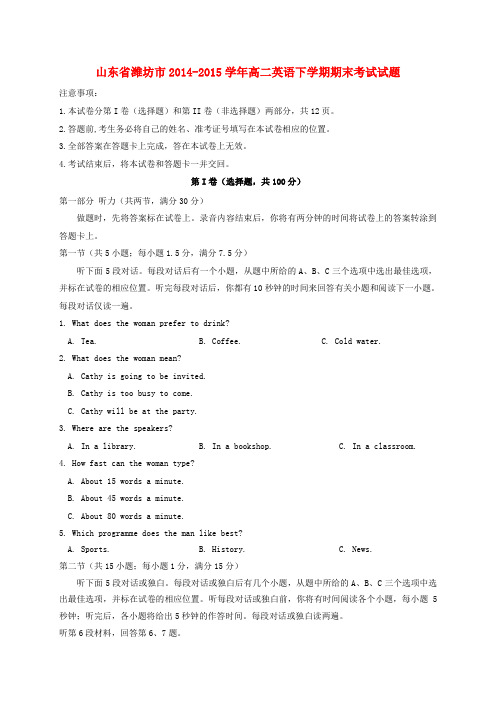
山东省潍坊市2014-2015学年高二英语下学期期末考试试题注意事项:1.本试卷分第I卷(选择题)和第II卷(非选择题)两部分,共12页。
2.答题前,考生务必将自己的姓名、准考证号填写在本试卷相应的位置。
3.全部答案在答题卡上完成,答在本试卷上无效。
4.考试结束后,将本试卷和答题卡一并交回。
第I卷(选择题,共100分)第一部分听力(共两节,满分30分)做题时,先将答案标在试卷上。
录音内容结束后,你将有两分钟的时间将试卷上的答案转涂到答题卡上。
第一节(共5小题;每小题1.5分,满分7.5分)听下面5段对话。
每段对话后有一个小题,从题中所给的A、B、C三个选项中选出最佳选项,并标在试卷的相应位置。
听完每段对话后,你都有10秒钟的时间来回答有关小题和阅读下一小题。
每段对话仅读一遍。
1. What does the woman prefer to drink?A. Tea.B. Coffee.C. Cold water.2. What does the woman mean?A. Cathy is going to be invited.B. Cathy is too busy to come.C. Cathy will be at the party.3. Where are the speakers?A. In a library.B. In a bookshop.C. In a classroom.4. How fast can the woman type?A. About 15 words a minute.B. About 45 words a minute.C. About 80 words a minute.5. Which programme does the man like best?A. Sports.B. History.C. News.第二节(共15小题;每小题1分,满分15分)听下面5段对话或独白。
